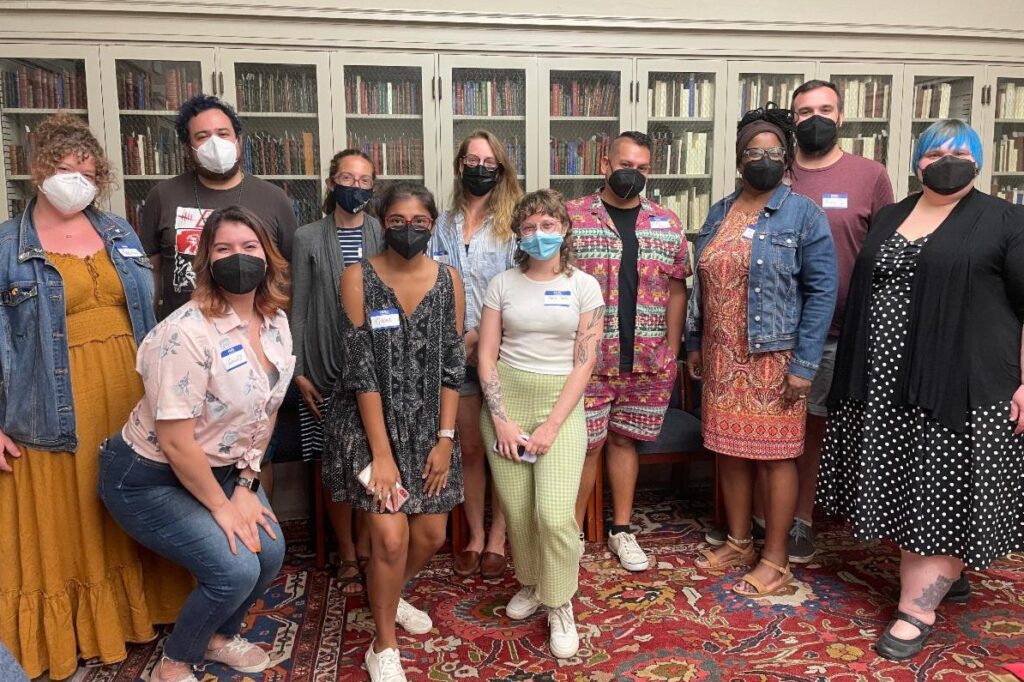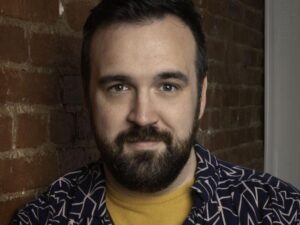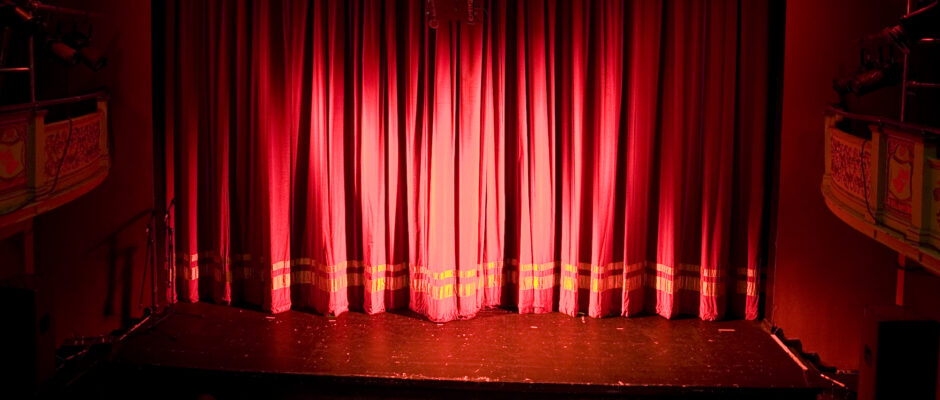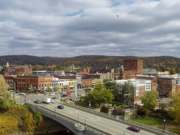Arts coverage has been on the wane for years. These are lean times for publications and this section is often the first one on the chopping block. But a lack of attention to the performing arts has a trickle down impact, making it harder for shows to draw an audience and succeed economically. In the long run, this will mean fewer performances, fewer events to cover, even less coverage — and a less vibrant city.
Theatre Philadelphia saw this cycle intensifying and stepped into the void. An umbrella marketing and support organization for the local performing arts scene, they set out to train the next generation of critics, providing a passionate group of theater lovers with the skills and connections to revive the critical ecosystem. The result was the first Content + Criticism Cohort (CC+C), funded by a PA Sharp grant from PA Humanities.
“A lot of folks were reaching out, concerned about the papers of record in our area stopping theater coverage or decreasing theater coverage — even just arts and culture writing being let go in general,” says LaNeshe Miller-White, executive director of Theatre Philadelphia. “We were also having conversations with the news outlets trying to see where their priorities were and how we can better help them to easily write about theater.”

“It was a big fear that if no one is writing about the work that we’re producing, then we won’t get playwrights wanting to have their work produced here and we won’t be a region of new work and world premieres as we are now,” she adds. “What can we do to strengthen the content being created around theater in the region?”
The excitement surrounding the launch of CC+C was a great reminder of the role theater plays in sparking change and igniting conversation.
“We realized this even more with the lack of it during COVID: The performing arts offer an opportunity to see a story from someone who is not like you and the opportunity to understand something or learn something about a different set of people — or to learn something about yourself,” says Miller-White. “Theater is a mirror. Of all the art forms, I feel like it gives the greatest impact for learning understanding in connection with other people.”
The program comprised a series of workshops covering everything from the history of theater criticism — with an assist from the Free Library of Philadelphia — to dance, to interviewing skills, to podcasting, to decolonizing arts media. All the workshop leaders and the participants were compensated for their time. Miller-White and her team selected 11 applicants for the initial cohort.
“We had a range of folks from different backgrounds,” she recalls. “We had a couple who were actually playwrights and were looking to use those writing skills for creating critical content. We had some directors. We had some that were performing artists. Some had done some writing before in publications or just on their own blogs and things.”
Frank Deane-Schierloh has lived in Philadelphia for over a decade. During that time, his role in the theater community was primarily as a performer.
What can we do to strengthen the content being created around theater in the region?LaNeshe Miller-White, Theatre Philadelphia
“During the pandemic, my priorities kind of shifted,” he recalls. “I realized that while I still love performing, I wanted to take a more analytical, critical approach to theater. So I started writing in my free time.”
He saw an ad for the cohort on Theatre Philadelphia’s website and it perfectly aligned with this new direction. Since completing the program, he has launched his own review website and written theater reviews for Phindie, The Philadelphia Inquirer and Theatre Philadelphia.

“I would say theater criticism is important because it helps theater artists hone their craft,” he explains. “And I think theater criticism has a twofold job: I think one is uplifting and talking about theater productions and what does or doesn’t work. And then I think there’s also the marketing side of it as well. Good and or bad criticism of shows can help boost ticket sales.”
Deane-Schierloh especially responded to the session at the Free Library, which was a foray into local theater history via materials from the 18th and 19th centuries — “The theater history nerd in me was at peak level that day.” He also responded to the final session on race and how to incorporate discussions of systemic injustice into criticism. According to Miller-White, that workshop ran over because there was just so much to say.
Krista Mar, another cohort member, had a love of theater, but a career in data science and tech. She attended shows mostly to support friends and stay close to that creative energy. After a particularly exciting performance, she felt inspired — Mar typed up a review and posted it to a new public Instagram account (@krista.reviews). A writer for the Broad Street Review saw her take and encouraged her to pitch the publication. Then she found out about CC+C.
“I wasn’t sure exactly what to expect,” she recalls. “I consider myself a lifelong learner. Really great people from within this theater community in Philly were willing to give us time and teach us different aspects of how they think about theater. It was an excuse to pick the brains of really smart people and theater artists and learn more about what they’re doing. I think it was a good way to foster connections and build community.”
Mar is now a contributor to Broad Street Review with an emphasis on plays by diverse voices. She lived in New York City for 10 years before moving to Philadelphia and has been surprised and inspired by the vibrancy of the local theater scene.

“When I moved to Philly, I was kind of like, what will Philly be in comparison to New York?” she says. “I was such an elitist. But I came to Philly and I was like, wow, there is a really great BIPOC theater scene. I think what I’m really impressed by in theater artists from Philadelphia is that they’re actors and directors, they’ve done costumes. They’ve done every aspect of theater. I think it allows theater artists to be more creative in how they think about things.”
Planning has already begun for the second cohort, which Theatre Philadelphia hopes to launch this summer. Miller-White and her team are hoping to incorporate more forms of media, including video via a partnership with PhillyCAM. They also hope to continue challenging conventions.
“Another one of the criticisms [from our early conversations] was that the people who were writing about theater didn’t really seem to be knowledgeable or had an old school version of what criticism was,” explains Miller-White. “What people are wanting now — and I had this conversation with the new arts editor at The Inquirer — is they’re not interested in ‘this was good’ or ‘this was bad.’ It’s a more nuanced way to look at things. So this group was set up for that. I think that’s why we’re seeing them out there creating their own content, and also being picked up by Broad Street Review and The Inquirer.”
I think theater as a whole is one of the only art forms where you’re actually able to examine the human experience up close and personal.Frank Deane-Schierloh
Deane-Schierloh certainly came out with a full head of steam, ready to contribute to the conversation.
“[CC+C] definitely gave me a newfound confidence in my abilities and my skill set,” he says. “I learned a fair amount about the theater press industry in general — how to pitch things, how to make connections — while also reinforcing the level of critical thinking you have to utilize.”
The thing that everyone involved in this program shares is a love of theater, and a deep belief in Philadelphia’s status as a world-class city for the performing arts.
“I think theater as a whole is one of the only art forms where you’re actually able to examine the human experience up close and personal,” explains Deane-Schierloh. “And I think that that connection that is able to be made between an audience and a performer is such a rare thing. Theater is such a visceral connection that can really effect change and effect conversation in a much quicker, less abstract way.”
This story is part of the “We Are Here” series, which has been created in partnership with PA Humanities, an organization dedicated to building community and sparking change.
Funding for “We Are Here” comes from PA Humanities and its federal partner, the National Endowment for the Humanities, as part of the American Rescue Plan Act of 2021.

